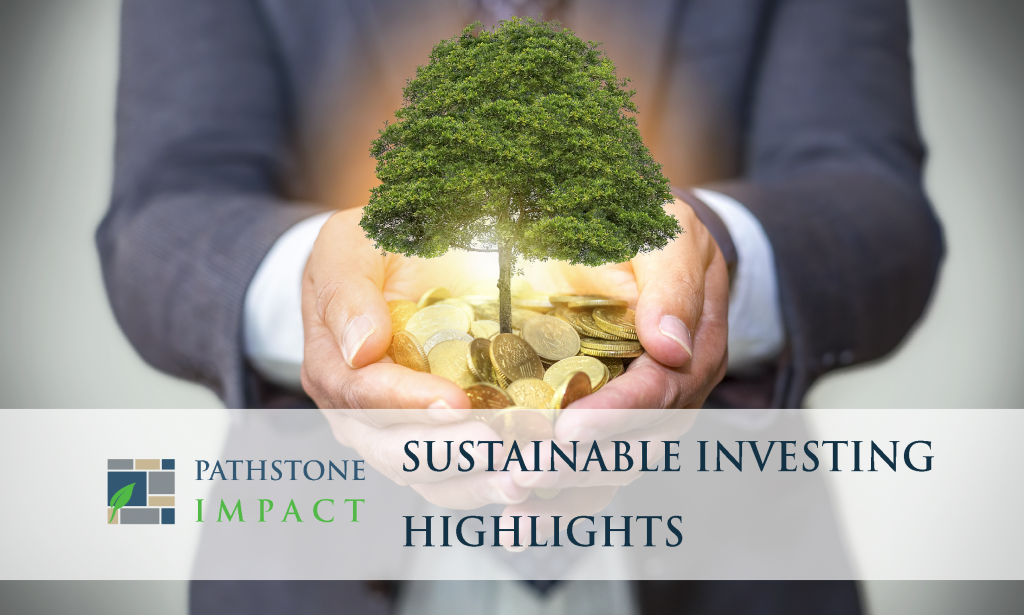Regulatory Perspective on ESG Disclosures
Regulators in the US and Germany continued to monitor financial firms that offer strategies labeled as environmental, social, and governance (“ESG”), and have proposed new rules for financial institutions. In the U.S., The Department of Labor (“DOL”) and the Securities and Exchange Commission (“SEC”), and in Germany, the Federal Financial Supervisory Authority (“BaFin”) have sharpened their regulatory tools to provide more oversight, foster an appropriate review of risks, and better curtail what has been referred to as “greenwashing”.
A recent DOL proposed rule would explicitly allow financial professionals with a fiduciary duty to consider climate change and other environmental, social and governance factors when making investment decisions and exercising shareholder rights. The proposal effectively reverses rules adopted earlier under the Trump administration.
The SEC under the leadership of Chairman Gary Gensler is also expected to issue a new corporate disclosure related to the risks presented by climate change and the transition to a lower-carbon economy.
Meanwhile, DWS Deutsche Bank has come under pressure for allegedly misleading investors regarding their ESG strategies. Both the SEC and BaFin have initiated probes into the activities of DWS to determine whether the wealth management firm is being clear with respect to their ESG labeling.
Child Labor and the Palm Oil Industry in Papua New Guinea
The palm oil industry has often appeared in the news in recent years for negative reasons. A new report highlights potential human rights violations involving some companies operating in Papua New Guinea, providing another example of the reputational risks faced by multinational companies associated with the palm oil industry.
A two-year study by the international non-governmental organization Global Witness has highlighted widespread human rights violations and deforestation in Papua New Guinea. According to the report, companies and brands such as Nestle, Colgate-Palmolive, Kellogg, and Danone have ties within their palm oil businesses to companies within their supply chains that are linked to severe child labor controversy.
Global Witness uncovered that local and regional actors were heavily involved in child abuse, including beating up villagers in Papua New Guinea that were opposing their palm oil activities.
COP26 Key Takeaways and Recent Perspectives on trends to reduce emissions
The outcome of COP26 is not only a formal agreement, but also a pledge to reduce global deforestation, a pledge to reduce methane emissions, an agreement to stop foreign funding for oil and gas projects, and a trade agreement for steel and aluminum. Through days of negotiations and speeches, world leaders shed a light on the severity of climate change risks if left unchecked.
Key takeaways from COP26 range from financial commitments to the need to hold heavy polluters accountable.
- The big push for both public and private financing. COP 26 underscored the need for global commitments to fund projects aimed at addressing climate change. Early-stage companies in developing countries often face a higher hurdle for obtaining funding and are often at a greater risk of more severe adverse outcomes that could result from climate change.
- The target remains 1.5 degrees Celsius. The 2015 Paris Agreement resulted in a commitment to limit the increase in global average temperature to “well below 2°C” from pre-industrial levels”. Numerous stakeholders have expressed a keen interest in keeping the global temperature target at 1.5°C. COP26 was able to rekindle the commitment by all Parties towards meeting the 1.5°C target.
- The need to phase out coal. The COP 26 agreement pushes member countries to accelerate efforts towards phasing out coal production and utilization.
- Methane Pledge. The discussions o COP26 have launched a global methane pledge aimed at reducing 30% of global methane emissions by 2030. However, several countries with major methane emitters, including Australia, Russia, and China, did not commit to the pledge.
Meanwhile, as key parties were negotiating the path forward to reduce the severity of climate change, several global banks were resistant to clarifying the details of their planned journey to achieve net-zero emissions. According to an internal report from the Financial Times, a number of major banks will continue providing financing for new oil, gas, and coal exploration projects this year, rather than suspending lending in order to move toward net-zero in a more clear and direct manner.
For more on Cop 26, click here to view the recording of our Fireside Chat: COP26 Review and Economic Impact Featuring Afsaneh Beschloss and Erika Karp: VIEW RECORDING
Please see the PDF version of this article for citations and important disclosures.
Sources:
[1] Brian Croce. “DOL proposal supports ESG considerations for fiduciaries.” Pensions & Investment. October 13, 2021. Accessed December 17, 2021. https://www.pionline.com/regulation/dol-proposal-supports-esg-considerations-fiduciaries
[2] Tim Quinson. “Regulators intensify ESG scrutiny as greenwashing explodes.” Bloomberg. September 01, 2021. Accessed December 17, 2021. https://www.bloomberg.com/news/articles/2021-09-01/regulatory-scrutiny-of-esg-greenwashing-is-intensifying
[3] Cam Simpson, Akshat Rathi, and Saijel Kishan. “The ESG Mirage.” Bloomberg. December 10, 2021. Accessed December 17, 2021. https://www.bloomberg.com/graphics/2021-what-is-esg-investing-msci-ratings-focus-on-corporate-bottom-line/
[4] Alex Thomson. “ Exclusive: Palm oil bosses human rights abuses claims.” October 7, 2021. Channel 4 News. https://www.channel4.com/news/exclusive-palm-oil-bosses-human-rights-abuses-claims
[5] Desmond Butler. “In secret tapes, palm oil execs disclose corruption, brutality.” Washington Post. October 9, 2021. Accessed December 17, 2021. https://www.washingtonpost.com/climate-environment/2021/10/09/png-palm-oil-undercover-sting/
[6] United Nations in Western Europe
[7] Justin Worland. “Why It Feels So Hard to Understand What Really Happened at COP26.” Time. November 17, 2021. Accessed December 17, 2021. https://time.com/6120266/cop26-takeaways/
[8] Owen Walker and Stephen Morris. “Big banks resist most direct road map to net zero emissions.” October 10, 2021. Accessed December 17, 2021. https://www.ft.com/content/9105cc47-58fb-47dc-8233-6b622fb56ae2







